🧠⚡💊 Divalproex 250mg Tablet: Broad-Spectrum Solution for Seizures, Bipolar Disorder & Migraines
Divalproex 250mg tablet is a prescription medication that combines sodium valproate and valproic acid in a stable compound, used to manage several neurological and psychiatric conditions. It is most commonly prescribed for epilepsy, bipolar disorder (especially manic episodes), and for the prevention of migraine headaches. Divalproex provides more consistent blood levels, improved gastrointestinal tolerance, and a sustained release formulation compared to traditional valproic acid.
🔬 Mechanism of Action
Divalproex enhances gamma-aminobutyric acid (GABA) activity in the brain, which is a key inhibitory neurotransmitter. This helps:
-
Reduce abnormal electrical activity in the brain (anticonvulsant action)
-
Stabilize mood swings in bipolar patients
-
Prevent cortical spreading depression, a phenomenon associated with migraines
It may also block sodium and calcium channels, reducing nerve excitability.
📌 Indications and Uses
Divalproex 250mg is approved for:
🔹 Neurological Uses
-
Epilepsy: for partial seizures, absence seizures, generalized tonic-clonic seizures
-
Migraine prophylaxis: reduces frequency and severity of migraines (not for acute attacks)
🔹 Psychiatric Uses
-
Bipolar disorder: controls acute manic episodes, mood stabilization, and long-term maintenance
It may also be used off-label in aggression, schizoaffective disorder, and neuropathic pain, based on clinical discretion.
💊 Dosage and Administration
-
Initial dosing typically begins with 250mg two or three times daily
-
Dose adjusted based on:
-
Condition treated
-
Patient age and weight
-
Serum valproate levels (therapeutic range: 50–100 mcg/mL for seizures, 50–125 mcg/mL for mania)
-
-
Best taken with food to reduce gastrointestinal side effects
-
Tablets should be swallowed whole, not crushed or chewed
Always follow physician instructions for titration and monitoring.
⚠️ Precautions and Warnings
-
Black Box Warnings for:
-
Hepatotoxicity (especially in children under 2 years)
-
Pancreatitis
-
Fetal harm (can cause neural tube defects, cognitive impairment)
-
-
Regular monitoring of:
-
Liver function tests (LFTs)
-
Pancreatic enzymes
-
Serum valproate levels
-
-
Use with caution in:
-
Liver disease
-
Blood disorders
-
Pregnancy (only if benefits outweigh risks)
-
Women of childbearing age should use effective contraception and may be prescribed folic acid supplementation.
🤒 Side Effects
Common:
-
Nausea, vomiting, or indigestion
-
Drowsiness, dizziness
-
Tremors
-
Weight gain
-
Hair thinning
Serious:
-
Liver failure
-
Pancreatitis
-
Severe allergic reactions
-
Low platelets (thrombocytopenia)
-
Mood or behavior changes (especially in young people)
Seek urgent care for abdominal pain, yellowing of skin, unusual bruising, or thoughts of self-harm.
🔄 Drug Interactions
-
May interact with:
-
Antiepileptics (phenytoin, carbamazepine)
-
Aspirin (increased free valproate levels)
-
Antidepressants or antipsychotics (enhanced CNS effects)
-
Oral contraceptives (reduced efficacy)
-
Close monitoring and dose adjustments may be required.
🧊 Storage Instructions
-
Store below 25°C, in a dry place
-
Keep out of reach of children
📝 Conclusion
Divalproex 250mg tablet is a versatile and effective medication for managing epilepsy, bipolar disorder, and migraine prevention. With its broad-spectrum activity, improved tolerability, and stabilized release, it remains a mainstay in neuropsychiatric treatment. Regular monitoring and adherence to dosage can lead to significant improvement in quality of life for affected individuals.
Note: This information is intended for educational purposes and should not replace professional medical advice. Always consult a healthcare provider for personalized guidance.
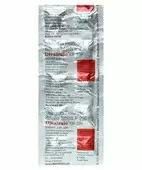

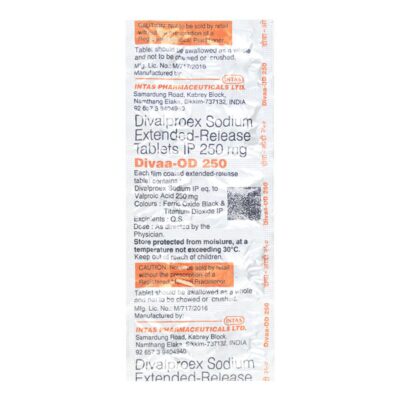
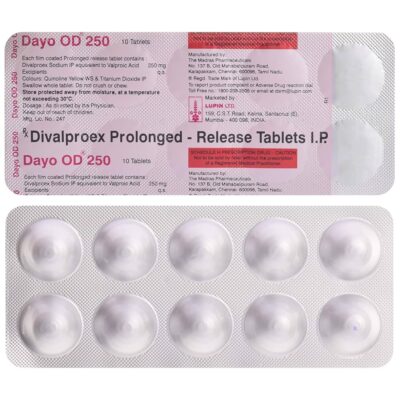
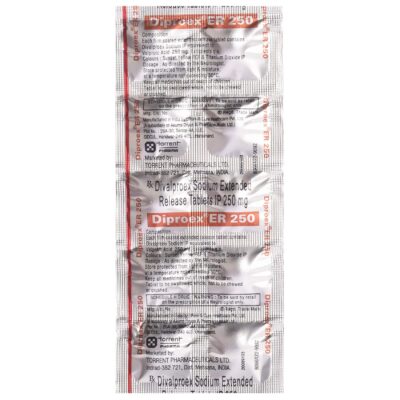
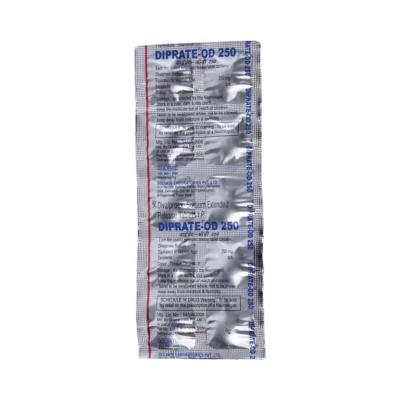
Reviews
There are no reviews yet.